
"Physical" is a song recorded by British-Australian singer Olivia Newton-John for her 1981 eleventh studio album of the same name. It was released as the album's lead single on 28 September 1981. The song was produced by John Farrar and written by Steve Kipner and Terry Shaddick, who had originally intended to offer it to Rod Stewart. The song had also been offered to Tina Turner by her manager Roger Davies, but when Turner declined, Davies gave the song to Newton-John, another of his clients.

"If" is a song written by American singer-songwriter David Gates in 1971. Originally popularized by his group Bread, "If" charted at No. 4 on the U.S. Billboard Hot 100 when released as a single in 1971 and No. 6 in Canada. It also spent three weeks at No. 1 on the U.S. Easy Listening chart, and one week at the top of the Canadian AC chart.

"I Just Called to Say I Love You" is a ballad written, produced, and performed by American R&B singer and songwriter Stevie Wonder. It was a major international hit, and remains Wonder's best-selling single to date, having topped a record 19 charts.
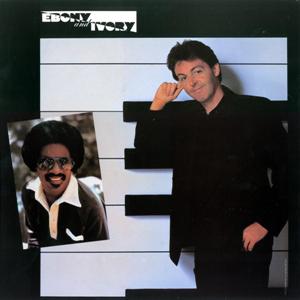
"Ebony and Ivory" is a song that was released in 1982 as a single by Paul McCartney featuring Stevie Wonder. It was issued on 29 March that year as the lead single from McCartney's third solo album, Tug of War (1982). Written by McCartney, the song aligns the black and white keys of a piano keyboard with the theme of racial harmony. The single reached number one on both the UK and the US charts and was among the top-selling singles of 1982 in the US. During the apartheid era, the South African Broadcasting Corporation banned the song after Wonder dedicated his 1984 Academy Award for Best Original Song to Nelson Mandela.

"Signed, Sealed, Delivered " is a soul song, by American musician Stevie Wonder, released in June 1970 as a single on Motown's Tamla label. It spent six weeks at number one on the U.S. R&B chart and peaked at number three on the U.S. Pop chart. In the same year, the song was also released on the album Signed, Sealed & Delivered.

"That Girl" is a song by American R&B singer and songwriter Stevie Wonder. It was the leading single from Wonder's album-era 1982 greatest-hits compilation, Stevie Wonder's Original Musiquarium I, as one of four newer songs from the collection. The song spent nine weeks at number one on the Billboard R&B singles chart – the longest time a Stevie Wonder single spent at the top spot – and reached number four on the Billboard Hot 100.

"Part-Time Lover" is a song by American R&B singer and songwriter Stevie Wonder, released as the first single from his twentieth studio album, In Square Circle (1985). The song reached number one on the Billboard Hot 100, R&B, dance, and adult contemporary charts, becoming Wonder's final number one hit to date. The song's simultaneous chart successes made Wonder the first artist to score a number-one hit on four different Billboard charts. The song was also released as a special 12" version. Lyrically, it tells the story of a man who is cheating on his wife with a mistress, only to find out in the end that his wife is cheating on him as well.
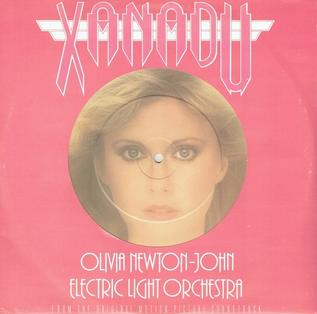
"Xanadu" is the title song from the soundtrack of the 1980 film Xanadu. Written by Jeff Lynne of the English rock band Electric Light Orchestra (ELO), the song is performed by English-born Australian singer, songwriter and actress Olivia Newton-John, with Lynne adding parenthetic vocals in the style of his other songs on the Xanadu soundtrack, and ELO providing the instrumentation. It was Lynne's least favourite of his own songs. "Xanadu" reached number one in several countries and was the band's only UK number-one single, when it peaked there for two weeks in July 1980. It was certified silver by the British Phonographic Industry. It also peaked at number eight on the US Billboard Hot 100.

Olivia's Greatest Hits Vol. 2 is the second greatest hits album by Olivia Newton-John released on 3 September 1982. The album compiled most singles released by Newton-John since the release of her 1977 Olivia Newton-John's Greatest Hits album from her following albums and soundtracks. The album included two new recordings; "Heart Attack" and "Tied Up", both of which were actually recorded during the sessions for the Physical album. It was released in the United Kingdom as Olivia's Greatest Hits.
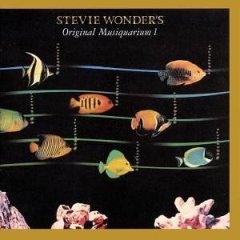
Stevie Wonder's Original Musiquarium I is a compilation album by R&B/soul musician Stevie Wonder that was released in 1982 by Tamla Records. It collects eleven Top 40 hit singles and five album tracks, including four previously unreleased tracks, from 1972 to 1982. The album peaked at No. 4 on the Billboard 200, at No. 1 on the Top R&B Albums chart in the U.S., and went to No. 8 in the UK. It has been certified gold by the RIAA. The four new songs were issued as singles to promote the album, with "That Girl" and "Do I Do" reaching the top 10 and top 20 of the US pop chart and number one and two on the R&B chart, respectively.

"Hopelessly Devoted to You" is a song recorded by British-Australian singer, songwriter and actress Olivia Newton-John for Grease: The Original Soundtrack from the Motion Picture (1978). It was written and produced by John Farrar and originally performed by Newton-John in the film version of the musical Grease (1978). The song was released in Australia in August 1978 and peaked at number two. It reached number three on the US Billboard Hot 100 and number seven on the Adult Contemporary chart. On the country chart, "Hopelessly Devoted to You" peaked at number 20 and was her first top 20 country hit in two years. Newton-John performed the song at the 21st Grammy Awards in 1979.
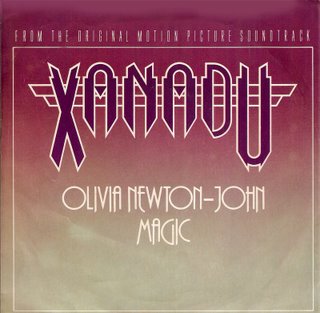
"Magic" is a song recorded by British-Australian singer Olivia Newton-John for the soundtrack to the 1980 musical fantasy film Xanadu. Written and produced by John Farrar, the song was released as the lead single from the album in May 1980 and topped the US Billboard Hot 100 for four weeks beginning on August 2. On August 30, it was displaced from the top by Christopher Cross's "Sailing".
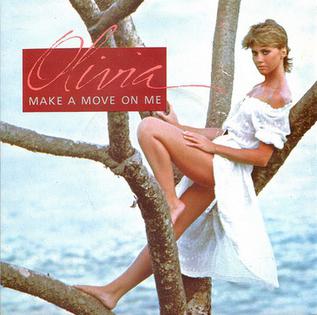
"Make a Move on Me" is a song recorded by singer Olivia Newton-John for her eleventh studio album. Physical (1981). It was written by John Farrar and Tom Snow, and produced by the former. The follow-up single to the number-one hit "Physical", it was released in January 1982 and peaked at number five on the US Billboard Hot 100 that April. It also became her twelfth and final single to be certified Gold by the Recording Industry Association of America (RIAA).

"A Little More Love" is a song recorded by British-Australian singer Olivia Newton-John for her tenth studio album, Totally Hot (1978). Written and produced by Newton-John's long-time record producer John Farrar, the song was released as the lead single from Totally Hot in October 1978 and became a worldwide hit single.

"Love Light in Flight" is a song written, produced, and performed by American R&B singer-songwriter Stevie Wonder. It was released in 1984, from The Woman in Red soundtrack. It peaked at number 4 on Billboard Black Singles, number 1 on the RPM Adult Contemporary chart, and number 17 on the Billboard Hot 100 for February 2, 1985.




















